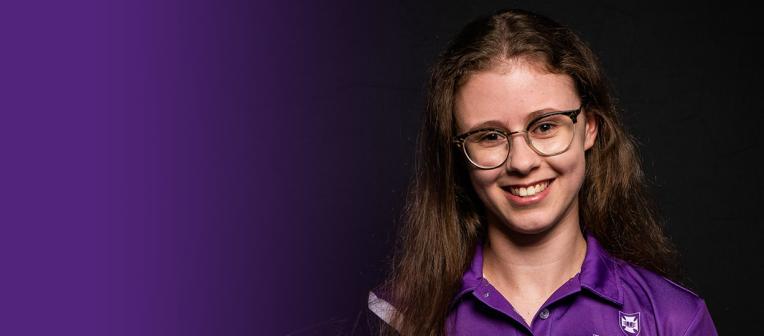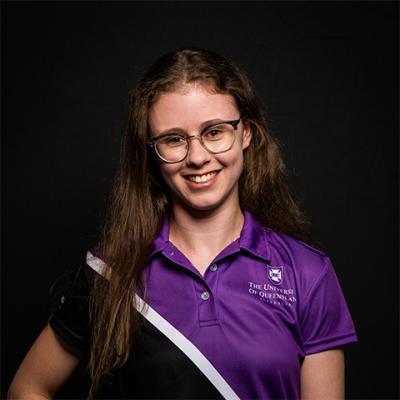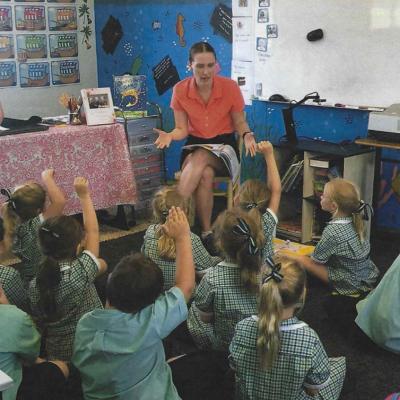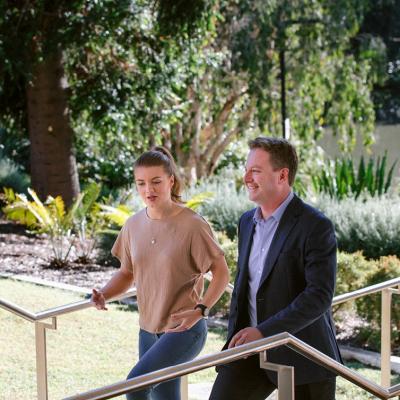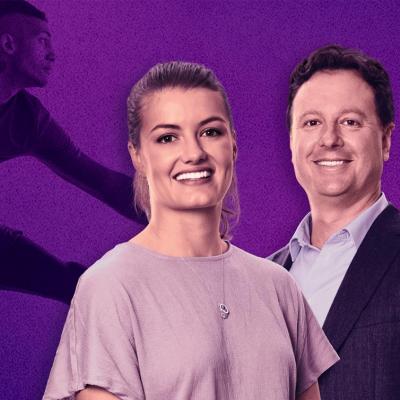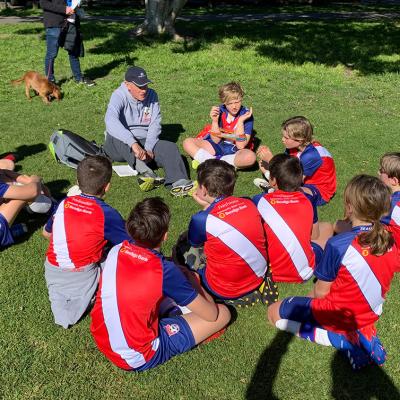Considering studying exercise and sport sciences at university? You may have lots of questions. We're here to help you find answers.
- Is sport and exercise science a good degree?
- What does a day in the life of an exercise and sport sciences student look like?
- Why study exercise and sport sciences?
- What jobs can you get with sport and exercise science?
We've interviewed a UQ student to find out. Carina Hagarty is a Bachelor of Exercise and Sport Sciences (Honours) student, and she's here to share her experiences and insights into what it's like to study this program at UQ, to give you a better idea of what to expect.
Let's find out if exercise and sport sciences sounds like the study area for you.
What’s the most unexpected thing you’ve learnt while studying exercise and sport sciences at UQ?
I had a few unexpected experiences while studying that turned out to be extremely rewarding. For example, I did not think that I would have the opportunity to work with younger children. However, part of my practical experience was helping children having trouble with basic movement skills such as walking and running. I also did not expect the program to go into detail about sports injuries, nutrition, or psychology.
What’s it really like to study exercise and sport sciences?
It is a challenging but extremely interesting program if you have a love for sport, are an athlete – or both! I think it is much more stimulating than people expect it to be, as it requires a sound knowledge of the human body, both physical and psychological, as well as an understanding of sports and then specific aspects of the sport you are working with at the time. There are lots of clinical practical elements that can be difficult to master if there isn’t enough time put into them, but it all becomes worth it when proper practicum hours come around.
"I personally also appreciate how the field encourages looking at an athlete as a whole human and highlights the importance of working around relevant external factors. It makes work so much more fluid and more challenging, as you’re presented with something different each day, and that is very rewarding."
What drew you to study exercise and sport sciences?
I’ve been involved in sport pretty much my entire life – what started with swimming lessons and dance classes in my toddler years evolved into elite gymnastics in my childhood. Eventually, trampoline stole my heart. Studying sports science allows me to stay within the sports sector in a capacity other than coaching and competing. I also saw it as an opportunity to expand on my experiences more, as well as a chance to combine sports theory with practical performance, which I’ve always been interested in. I also love seeing other people achieve their goals and helping them along the way, so sport sciences seemed like the best of both worlds.
What are the most valuable skills you’ve learnt while studying exercise and sport sciences?
Both for my career and future as well as in general, the most valuable thing I’ve learnt throughout my study has been how to work with people and how to individualise approaches to what could be similar problems. Clinically, I think learning all the practical skills such as strength and conditioning programming and undertaking testing with both the general population and athletes was also super valuable, as well as learning how to collate all the information gathered to assist whoever you’re working with. All of this has been fascinating and very useful in the field.
What does a day in the life of an exercise and sport sciences student look like?
As I am a student-athlete, my schedule probably differs from a typical student’s day.
A usual day for me starts with a trampoline training session or a trip to the gym in the morning, depending on what I have on for the day. I try to schedule as much as I can online, so if I’m not on campus I’ll head home and make a second breakfast while preparing for the classes I have that day. If I’m on campus, I’ll normally have my food with me, and I would head straight from the gym to campus. Then go to whatever class I had, or to the HMNS Student Hub to study until class. After classes, I will go straight to work, before finishing the day with a trampoline training session, have some dinner and then spend a little bit of time unwinding before bed at 11pm.
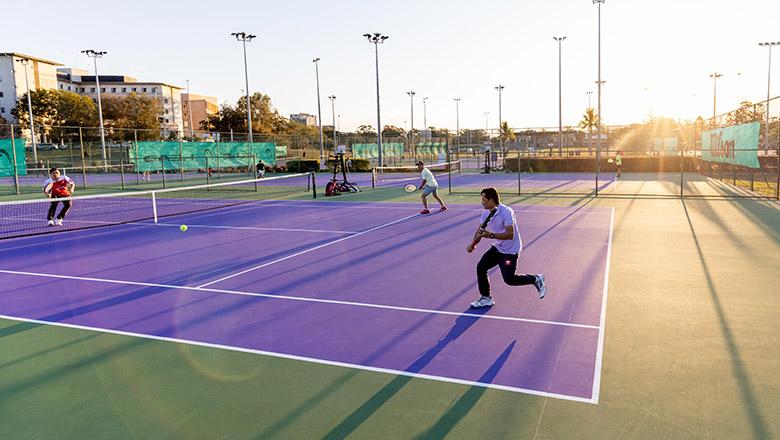
The UQ Bachelor of Exercise and Sports Sciences (Honours) covers a wide range of sports – lucky we have so many world-class sporting facilities.
What have you learned about yourself since you started your studies at UQ?
How much I procrastinate. I didn’t realise how much I put off until it came to exam time in first semester of first year. I was shocked when I realised how much I had to catch up on because I didn’t absorb or revise the information or would tell myself I had plenty of time. I also didn’t realise that I could engage so well with people. I’m a massive introvert and usually don’t like approaching or talking to people I don’t know, so this was a skill I was able to develop as I went through the program.
Are you a serial procrastinator too? UQ offers study skills advice and tips to help you get on top of your coursework and exams.
How have your teachers had a positive impact on your studies?
All my teachers have had a positive impact on my studies, whether through assistance with content or piquing my interest with certain topics, but particularly in the clinical subjects I’ve undertaken. They’re always willing to share the knowledge they have, whether it is directly related to the topic or not, and provide tricks and tips that make the content easier to remember and perform, which can assist greatly during exams and practicum.
Where do you want to go or what do you want to do in your exercise and sport sciences career?
I would love to work with a high-performance athlete population, whether in a team or individual sport. My practicums have been in football and I’m really enjoying exploring a sport I’ve never had experience with. However, my passion will always be for gymnastics. If I were to get an opportunity in that sport, I’d snatch it up in a heartbeat.
What’s the most interesting thing you've learnt that hasn't been part of your coursework?
How diverse each athlete can be, especially when they’re all a part of a team. It’s so interesting to see how vastly different athletes can fit so well onto a team when they’re playing sport – especially when they’re playing to their strengths. It’s also been remarkable to see (separately from my own training and sport) how outside factors can affect the performance of an athlete. In addition to this, how training, and even competition, may need to be altered with those factors in mind to allow the athlete to perform to the best of their ability.
What advice would you give to someone who wants to study exercise and sport sciences at UQ?
I think the Bachelor of Exercise and Sport Sciences program can be extremely rewarding.
UQ has some of the best facilities, teachers and connections within the industry, which can really assist with your learning. It also ensures you’ll have the opportunity to build upon the skills you need to succeed as a professional within the space. They have connections with so many different places you’ll get to pick from as a practicum site, which allows you to work with great people in so many different spaces. So put some thought into what sports you are most passionate about and seek out practical experience that aligns.
Explore the Bachelor of Exercise and Sports Sciences (Honours) or discover what it's really like to study other programs at UQ.

